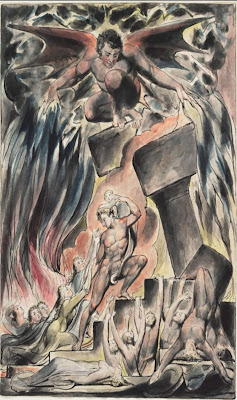Depression has been around for a very long time, in mild forms, it's good for us. I thought it'd be interesting to look back at the book of Job and see how Job coped with the nasty events Jehovah forced upon him, unfortunately, that Biblical allegorical advice on dealing with depression is particularly unhelpful.
If ever a man was likely to suffer depression from PTSD, it was Job. He certainly showed an inclination to have negative, and possibly suicidal, thoughts:
If ever a man was likely to suffer depression from PTSD, it was Job. He certainly showed an inclination to have negative, and possibly suicidal, thoughts:
“After this opened Job his mouth, and cursed his day.And Job spake, and said,Let the day perish wherein I was born, and the night in which it was said, There is a man child conceived.Let that day be darkness; let not God regard it from above, neither let the light shine upon it.Let darkness and the shadow of death stain it; let a cloud dwell upon it; let the blackness of the day terrify it.As for that night, let darkness seize upon it; let it not be joined unto the days of the year, let it not come into the number of the months.Lo, let that night be solitary, let no joyful voice come therein.Let them curse it that curse the day, who are ready to raise up their mourning.Let the stars of the twilight thereof be dark; let it look for light, but have none; neither let it see the dawning of the day:Because it shut not up the doors of my mother's womb, nor hid sorrow from mine eyes.Why died I not from the womb? why did I not give up the ghost when I came out of the belly?Why did the knees prevent me? or why the breasts that I should suck?” - Job 3 1:12Jehovah, Jehovah of the KJV, anyway, told Job to snap out of it:
“Gird up thy loins now like a man: I will demand of thee, and declare thou unto me.” - Job 40 7That didn’t work, so he compensated him, as an insurance company might, for his material losses:
“And the Lord turned the captivity of Job, when he prayed for his friends: also the Lord gave Job twice as much as he had before.Then came there unto him all his brethren, and all his sisters, and all they that had been of his acquaintance before, and did eat bread with him in his house: and they bemoaned him, and comforted him over all the evil that the Lord had brought upon him: every man also gave him a piece of money, and every one an earring of gold.So the Lord blessed the latter end of Job more than his beginning: for he had fourteen thousand sheep, and six thousand camels, and a thousand yoke of oxen, and a thousand she asses.He had also seven sons and three daughters.And he called the name of the first, Jemima; and the name of the second, Kezia; and the name of the third, Kerenhappuch.And in all the land were no women found so fair as the daughters of Job: and their father gave them inheritance among their brethren.After this lived Job an hundred and forty years, and saw his sons, and his sons' sons, even four generations.So Job died, being old and full of days.” - Job 42 10:17There’s nothing about poor Job feeling happier, or over his depression. Clearly he chose inappropriate names for his sons too. I wonder what they were.
On the bright side, there are suggestions that the Manna, spoken of in the Book of Exodus, was actually psilocybin (magic) mushrooms - which goes some way to explain why it took them 40 years to cross such a very small desert, and might also explain why, in the main, they seemed happy with the process, despite the occasional golden calf incident.







